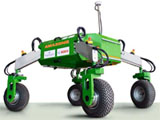Agricultural and Biological Systems Engineering, Department of

Department of Agricultural and Biological Systems Engineering: Faculty Publications
ORCID IDs
http://orcid.org/0000-0002-5799-6457
https://orcid.org/0000-0002-4539-7983
https://orcid.org/0000-0002-7589-9351
Document Type
Article
Date of this Version
2020
Citation
Biotechnology and Bioengineering. 2020;1–20.
DOI: 10.1002/bit.27647
Abstract
The investigation of new adjuvants is essential for the development of efficacious vaccines. Chitosan (CS), a derivative of chitin, has been shown to act as an adjuvant, improving vaccine‐induced immune responses. However, the effect of CS molecular weight (MW) on this adjuvanticity has not been investigated, despite MW having been shown to impact CS biological properties. Here, two MW variants of CS were in- vestigated for their ability to enhance vaccine‐elicited immune responses in vitro and in vivo, using a single‐dose influenza A virus (IAV) protein vaccine model. Both low‐ molecular‐weight (LMW) and high‐molecular‐weight (HMW) CS‐induced interferon regulatory factor pathway signaling, antigen‐presenting cell activation, and cytokine messenger RNA (mRNA) production, with LMW inducing higher mRNA levels at 24 h and HMW elevating mRNA responses at 48h. LMW and HMW CS also induced adaptive immune responses after vaccination, indicated by enhanced immunoglobulin G production in mice receiving LMW CS and increased CD4 interleukin 4 (IL‐4) and IL‐2 production in mice receiving HMW CS. Importantly, both LMW and HMW CS adjuvantation reduced morbidity following homologous IAV challenge. Taken together, these results support that LMW and HMW CS can act as adjuvants, although this protection may be mediated through distinct mechanisms based on CS MW.
Included in
Bioresource and Agricultural Engineering Commons, Environmental Engineering Commons, Other Civil and Environmental Engineering Commons


Comments
2020 The Authors